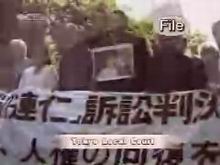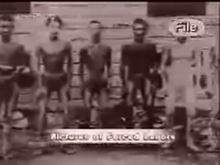 In 1941, the Pacific War broke out. A great number of Japanese were mobilized to fight for their country. In order to maintain normal domestic production and supplies, of weaponry in particular, the Japanese government implemented a coercive labor system and pressed nearly 40,000 laborers from the Northern China into forced labor. About 60 years on those that survived look back on a time full of spilt blood and tears. Now they have set their minds on winning back some of what the Japanese government took from them. In 1941, the Pacific War broke out. A great number of Japanese were mobilized to fight for their country. In order to maintain normal domestic production and supplies, of weaponry in particular, the Japanese government implemented a coercive labor system and pressed nearly 40,000 laborers from the Northern China into forced labor. About 60 years on those that survived look back on a time full of spilt blood and tears. Now they have set their minds on winning back some of what the Japanese government took from them.
According to historical research, the Japanese set up an organization called the Northern China Laborers Association, which was in charge of exporting Chinese people to Japan during World War II. Nowadays, the plight of these Chinese laborers has come to the forefront of suing the former Japanese government for exploitation.
Kang Jian said, "Quite a few lawsuits have been raised by the forced laborers. About seven or eight district courts across Japan have dealt with the laborers' lawsuits."
The laborer lawsuits number the largest of the actions by Chinese victims of World War II. The earliest one of all saw 11 former Chinese laborers launch the first ever lawsuit against the Kajima Corporation on June 28, 1995. They asked for an apology and compensation from the company for its exploitation, which harmed them both physically and mentally.
Geng Zhun, Commander of Hua Gang Insurrection said, "The Japanese Kajima Corporation persecuted us directly. The corporation should take full responsibility for that. The facts are clear and they can't be covered. The evidence of blood cannot be covered. "
The lawsuit originated from a real tragedy in history. In 1944, more than 1,000 Chinese laborers were forced to work in a copper mine belonged to Kajima Corporation. The workload there was extremely heavy while the working environment was terrifying. In addition, the Chinese laborers were treated like animals.
Geng Zhun, survivor of Forced Labors, said, "At the beginning, we worked 12 hours a day and then the work hours were lengthened to 16 hours a day. We didn’t have enough to eat and we were half starved. When winter came and it snowed, they did not give us cotton-padded clothes, they just gave us a vest. About 200 people died of cold or hunger in two months."
 On June 30,1945, more than 800 Chinese laborers launched an uprise in resisting the inhumane treatment by Kajima Corporation. The local authority mobilized up to 20,000 military policemen to conduct a crackdown, causing the death of 133 Chinese laborers. More than 50 years later, Kajima Corporation still refused to bear the legal duty on the death of the Chinese laborers. During the 8 years from 1995, the survivals of those Chinese laborers filed a total of 10 lawsuits in Japan. Among them, the lawsuit received in Fukuoka won the plaintiff fiscal compensation.
On June 30,1945, more than 800 Chinese laborers launched an uprise in resisting the inhumane treatment by Kajima Corporation. The local authority mobilized up to 20,000 military policemen to conduct a crackdown, causing the death of 133 Chinese laborers. More than 50 years later, Kajima Corporation still refused to bear the legal duty on the death of the Chinese laborers. During the 8 years from 1995, the survivals of those Chinese laborers filed a total of 10 lawsuits in Japan. Among them, the lawsuit received in Fukuoka won the plaintiff fiscal compensation.
Liu Qian, an old man living in Laishui County of Hebei province is among the plaintiffs filing lawsuits in Fukuoka. He said, "The security chief of the village told me to go to the local government for some public labor work. When we gathered at the local government, we were detained. When enough laborers were assembled, we were driven to the train and carried to Tang Gu port."
Du Zongren, Survivor of Forced Labors, said, "We dug coal, drilled dynamite holes and carved mining with shells. We did such kind of things all day long."
Zhang Wukui, Survivor of Forced Labors, said, "When we fell ill. They wouldn't give us food and said hunger could make us feel better. Food for a day was not even enough for a meal."
Liu Qian, Survivor of Forced Labors said, "We were beaten everyday for no reason. They did everything they could to beat us. Their tools included spades and rods."
Liu also said, "There is a Chinese saying that a murderer must pay with his life and debtor should pay money. The Japanese have a monetary debt from our blood and sweat. Your last generation owned the decedents and us have the responsibility to pay it back."
Liu Lianren, Survivor of Forced Labors, said, "I hope the case will be resolved this time. I am over 80. It is hard for me to come to Japan. The trip is tough."
Kang Jian said, "Generally speaking, the law is improving. The focus of the debate is prescription and whether the government can be insulated from lawsuits and the effectiveness of the Sino-Japanese joint declaration. We are making progress on these points. The verdicts by Tokyo district court in January and March have denied that the government can be insulated from lawsuits. This has never happened before."
The aggression and disaster of those years move farther and farther away with time and the bloodstains gradually fade. But, only when a nation bears those years firmly in mind, only when it refuses to tamper and forget history and only when it dares to face up to the suffering that it has caused, can it stand up and stop history from repeating itself.
|